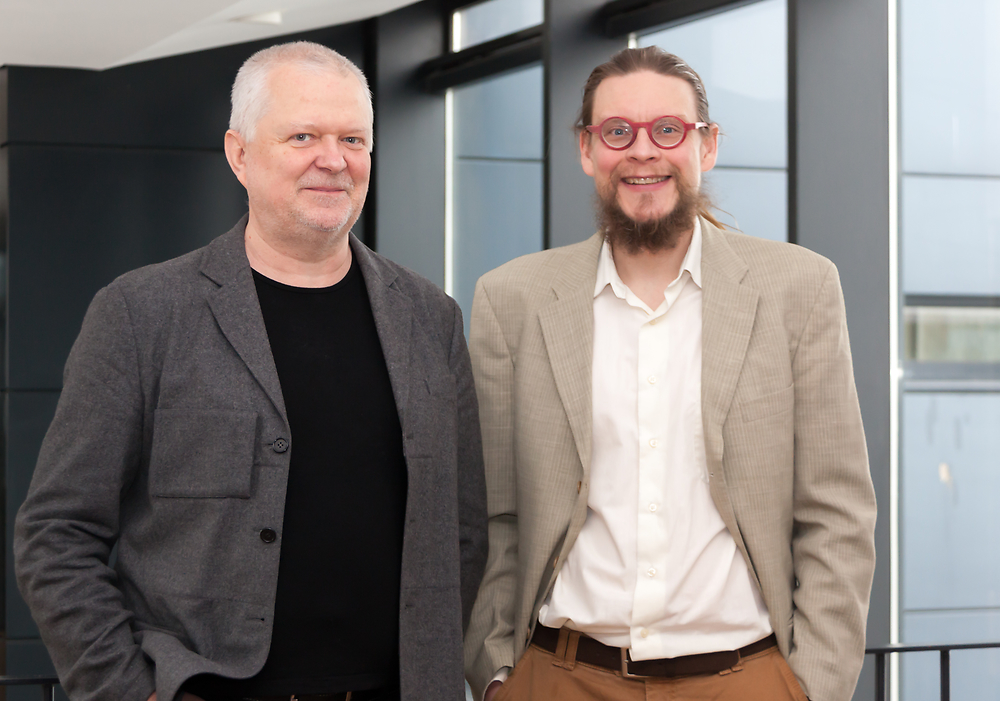April 03, 2023 | News | Research Center
New Max Planck Center for Social Inequalities in Population Health starts in Rostock and Helsinki

The two Directors of the Center: Pekka Martikainen und Mikko Myrskylä. © MPIDR/Wilhelm
Starting in July, MaxHel: Max Planck l University of Helsinki Center for Social Inequalities in Population Health aims to unearth the pivotal social processes that generate health inequalities by building on novel conceptual insight and a completely unique data landscape.
“The Center analyzes how social family constellations, genetic factors, and individual social characteristics jointly produce health inequalities”, says Mikko Myrskylä, Director of the Max Planck Institute for Demographic Research (MPIDR) in Rostock and one of the two Directors of the Center.
Starting their research in July 2023, a team of 14 Post-docs and PhD Students based in Rostock, Germany and Helsinki, Finland analyzes the causes of social inequalities, the drivers in long-term trends in inequalities, and how the inequalities manifest differentially across varying macro-level social conditions.
“The Center goes beyond standard observational research. We are using exceptionally detailed linked family-based data, natural experimental designs, genetically-informed social epidemiological data, and advanced dynamic modelling techniques. Uniquely all these data are currently available at the University of Helsinki”, says Pekka Martikainen, Professor of Demography at the Population Research Unit of the University of Helsinki and the other Director of the Center.
In Spring, a collaborative agreement is going to be co-signed by the Max Planck Society (MPS) and the University of Helsinki, which both contribute to the Center’s budget of more than 5 Million Euros. The Center Directors Myrskylä and Martikainen have successfully raised 2.5 Million Euros from the Max Planck Society, 2 Million Euros from the Jane and Aatos Erkko Foundation, 1 Million Euros from the Helsinki Metropolitan Area, and 0.5 Million Euro from the University of Helsinki.
The Center’s research agenda is based on four thematic pillars:
- FAMILY: to assess the causes of long-term changes in health inequalities and to establish the contribution of social family factors and multigenerational interdependencies in the production of social inequalities in health;
- GENETIC FACTORS: to estimate the effects of social position on health by employing genetic information and to assess how genetic associations are mediated or modified by family and social position;
- COMPARISONS: to evaluate variations in explanations of social inequalities in health by means of international comparative research; and
- METHODS: to advance causal multistate modeling and to integrate recent advances in counterfactual analysis from neighboring disciplines to inform analyses in Themes 1-3, and demography and population health research more generally.
The need to better understand the root causes of health inequalities is more pertinent than ever. “Social inequalities in health and mortality have grown and the unprecedented health and social consequences of the COVID-19 pandemic may hit the vulnerable the hardest, further exacerbating health gaps”, says Mikko Myrskylä.
MaxHel Center is hiring
If you are interested in Post-doctoral or PhD student opportunities, please contact MaxHel Directors Myrskylä or Martikainen. Positions are available both at Rostock and Helsinki departments of the Center, as well as shared positions with split time across the departments.
